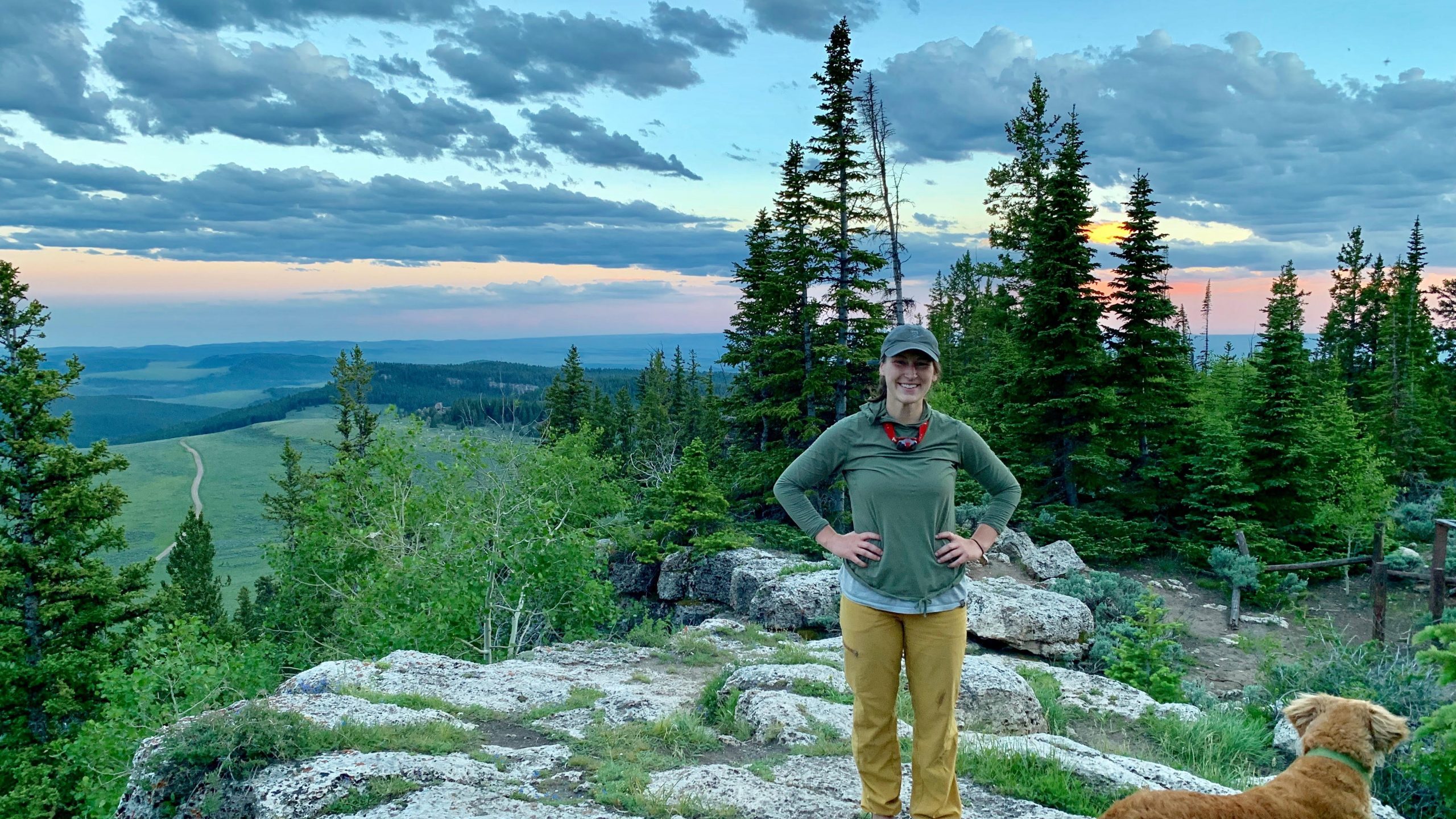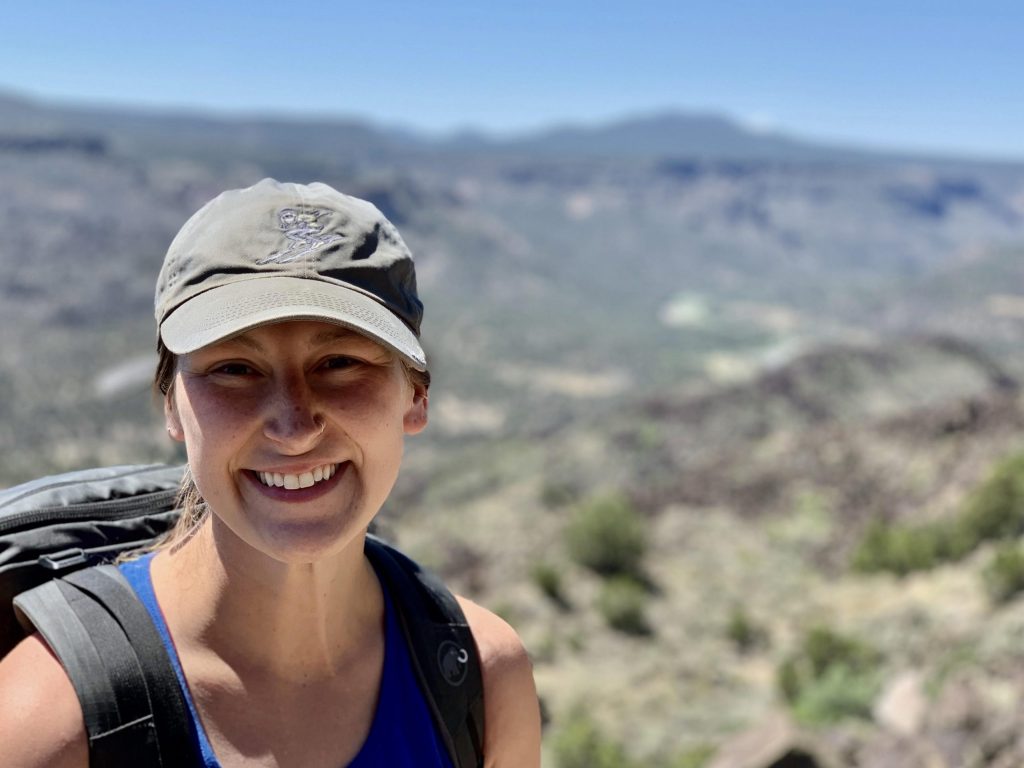Researcher Spotlight – Kate Jones

2019-20 Global Change Fellow
PhD Student, Center for Geospatial Analytics
Advisor: Dr. Robert Scheller
Every year the Southeast Climate Adaptation Science Center funds a multi-disciplinary cohort of Global Change Fellows representing colleges across NC State University. Here are some highlights about 2019-20 Fellow, Kate Jones, and the applied research she’s conducting.
About You
What do you study?
Forests, fire, and climate-adaptive management strategies in the Southern Appalachian mountains.
What (or who) influenced you to go into this field of study?
Growing up in eastern Tennessee and southwestern Virginia, I was encouraged to be curious about my tiny part of the world. It wasn’t until college that I found courses that captivated me and put my curiosity to better use. I was finally learning some of the critical “how’s” and “why’s” of the natural world. I discovered I was a geographer at heart. My geography courses wove my interests together in a way I had never experienced – I was learning to think about the world via much larger, connected systems. This interest led me to graduate school for my masters in forest ecology and spatial statistics, and then, a return trip for my PhD to study climate-adaptive strategies that are co-developed by forest managers and researchers.
What do you think is the most pressing issue related to global change?
In a world where collaboration is invaluable, connecting the right people with the right resources at the right time is a significant, but not insurmountable, challenge. We are often reminded how limiting the quest for “funding” can be in actually producing research. The global challenge will be organization and collaboration across disciplines to solve problems using fewer resources in less time. There must be a balance between infinite data collection/validation and sharing science in early stages. This may raise concerns about gaining public trust when science is released “prematurely,” but these concerns may be lessened through concerted public outreach, and most of all, public integration into the scientific process.
What is your dream job?
My dream job is to work at the interface of science and management. More specifically, I hope to increase the amount of co-produced, applied science to address problems that managers and practitioners are facing on the ground. Even when science exists, sometimes it fails to get connected to the people that need it most. I hope to facilitate lasting partnerships and encourage researchers to produce science with more purpose than a publication citation.
About Your Research

What results are you finding?
While the Southern Appalachian mountains do not experience the fire-crazed media of western landscapes with large, active fire seasons, there are still a variety of open questions related to prescribed fires and wildfires in the southern Appalachians. Among these open questions, the most important concept I have discovered is the idea of “scale mismatches” (Cumming et al. 2006). For prescribed fire planning or wildfire response, I think it is critical to make sure regional socio-ecological concerns are not addressed at the scale of individual counties – large landscapes call for coordination across managers, scientists, and property owners. There is a need for research that better frames the role of fire in Southern Appalachian socio-ecological systems, the spatial and temporal scales of different fire types, and new methods to quantify the effects of incorporating fire into current and future forest plans.
Who will benefit from your research?
I hope my research will aid forest planning and decision making at local to regional scales. The US Forest Service and the Nature Conservancy are two active groups helping to shape fire-related research agendas in the Southern Appalachian mountains.
How can your research be used to inform management decisions?
Ideally, my work will allow managers to see the future ecological impacts of implementing prescribed fires in their landscapes. Managers can simulate different ecological outcomes by choosing various locations, acreage, and timing for prescribed management actions. Model outputs can then be compared to their management objectives and goals on timescales of 5 to 50 years.
How would you describe your research to a 3rd grader?
You make decisions every day – What to wear? What to eat for lunch? And you have responsibilities – like taking the trash out or doing your homework. What if your responsibility was to make sure all of the trees in your neighborhood stayed healthy? My research works on scientific answers to help make those tough decisions easier for the people that are responsible for keeping all of our trees healthy.
About Your Global Change Fellow Experience
How do you expect the SE CASC Global Change Fellows Program to impact you and your work?
This program and its network has confirmed there is a broader community that believes in and needs applied, actionable science. The Global Change Fellows Program has been great for exposure and research inspiration.
What has been the most rewarding part of being a SE CASC Global Change Fellow?
Attending the SE CASC Regional Science Symposium in New Orleans, LA shaped how I think about connecting the science-management loop. It was my first experience with such diverse voices (managers, educators, museum curators, researchers, etc.) in the room. Conversations did not focus on combing through the details of an individual’s research methods, but rather, the focus was on how we as a community make sure scientists are asking the right questions informed by pressing management needs. In the few days, connections were made through existing work, and partnerships for future work were created through the sharing of ideas and hypothetical solutions.
What advice would you give to a student that is interested in getting involved in your field?
Begin with the idea that your work will benefit managers and their scientific questions. Make connections and seek out those people who share similar questions and purpose as you – it will only improve and refine your ideas.
References:
Cumming, G. S., D. H. M. Cumming, and C. L. Redman. 2006. Scale mismatches in social-ecological systems: causes, consequences, and solutions . Ecology and Society 11(1): 14. [online] URL: http://www.ecologyandsociety.org/vol11/iss1/art14/
